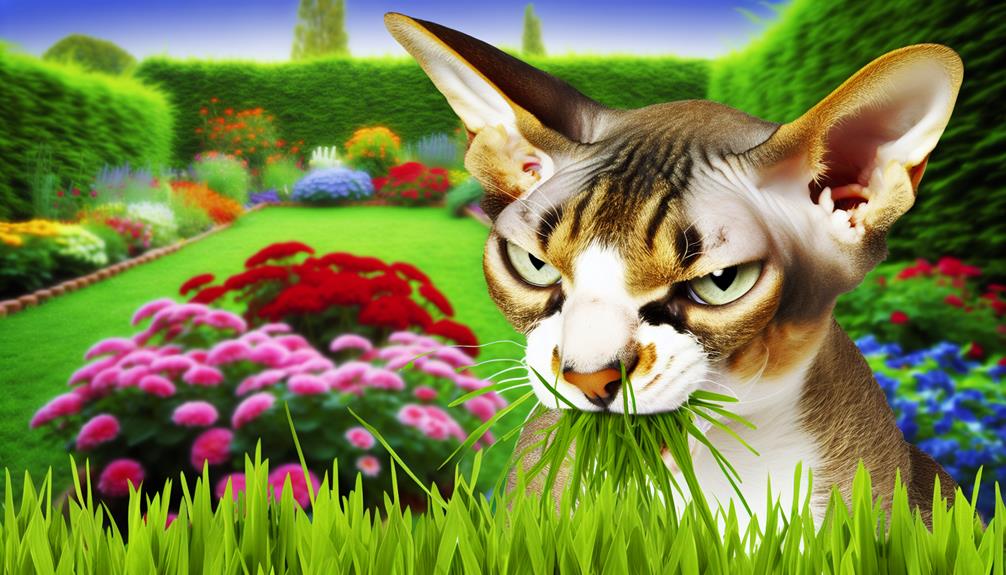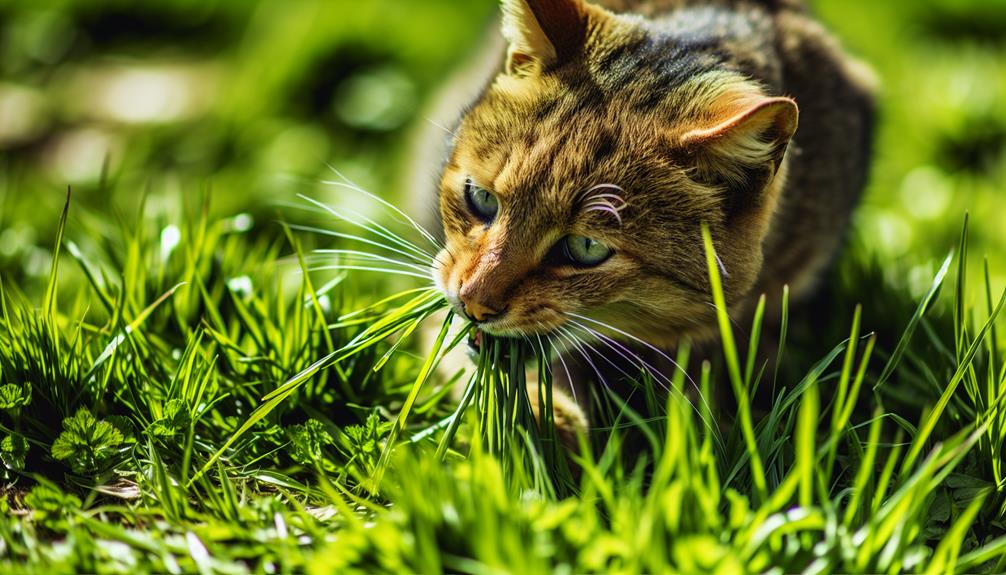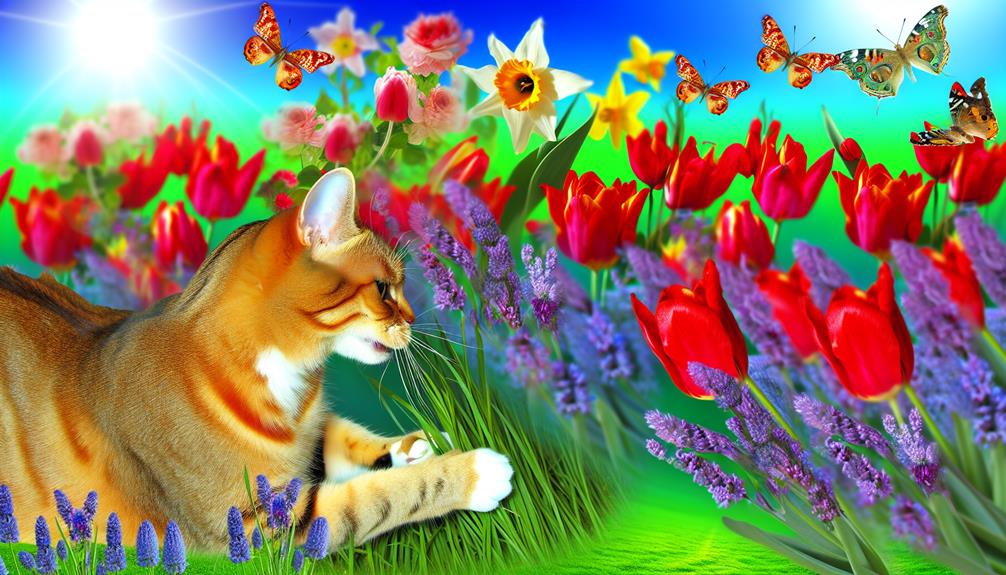Have you ever noticed your cat munching on grass and wondered why they do it? It's an intriguing behavior that might seem odd at first but has several underlying reasons. From acting as a natural laxative to helping with expelling hairballs, grass plays an essential role in your cat's digestive health. Additionally, it might be their way of addressing nutritional deficiencies or instinctual needs. But did you know this behavior could also be linked to parasite control? Let's explore how these factors contribute to your feline friend's peculiar dietary habits.
Dietary Fiber
Dietary fiber plays an important role in a cat's digestive health. As a cat owner, you might wonder why your feline friend occasionally munches on grass. It's vital to understand that dietary fiber, derived from various fiber sources, can greatly impact feline digestion. Fiber helps regulate bowel movements, prevents constipation, and maintains a healthy weight by promoting satiety.
There are two main types of dietary fiber: soluble and insoluble. Soluble fiber dissolves in water and forms a gel-like substance, which can slow down digestion and enhance nutrient absorption. Insoluble fiber, on the other hand, adds bulk to the stool and aids in the passage of food through the digestive tract. Both types are important for ideal feline digestion, and a balanced diet should contain a mix of these fibers.
Common fiber sources in a cat's diet include vegetables, fruits, and grains. However, cats are obligate carnivores, meaning their primary diet consists of meat. As a result, they don't require large amounts of fiber like omnivores do. It's vital to monitor the fiber content in your cat's diet to confirm it's appropriate for their needs. Overconsumption of fiber can lead to gastrointestinal issues, such as diarrhea or nutrient malabsorption.
Research shows that moderate fiber intake can prevent hairball formation, a common issue in cats. The fiber binds to ingested hair, facilitating its passage through the digestive system. Additionally, a diet with adequate fiber can help manage certain medical conditions, such as diabetes mellitus, by regulating blood glucose levels.
Natural Laxative
You might notice your cat eating grass to ease digestive discomfort, as it acts as a natural laxative. The fibrous content in grass promotes bowel movements by stimulating the gastrointestinal tract. This behavior is supported by evidence indicating that grass consumption can help cats expel hairballs and other indigestible matter.
Eases Digestive Discomfort
Many cat owners have observed their feline companions consuming grass and might wonder about this peculiar behavior. One primary explanation is that grass consumption can ease digestive discomfort. Cats are obligate carnivores, meaning their diet primarily consists of meat. However, certain grass types, such as wheatgrass and oat grass, are often preferred by felines due to their palatability and texture.
When a cat ingests these grasses, the fibrous content acts as a natural laxative, promoting gastrointestinal motility. This can help alleviate symptoms of digestive discomfort, which may include bloating, constipation, or ingestion of fur. The fibrous material in the grass can facilitate the passage of hairballs through the digestive tract, thereby reducing the risk of obstruction.
Scientific studies have indicated that grass consumption can also increase the production of bile and digestive enzymes, which aid in the breakdown of ingested food. This enzymatic activity can further enhance nutrient absorption and overall gastrointestinal health. Consequently, while it may seem peculiar, your cat's preference for specific grass types is rooted in a natural inclination to manage digestive health, providing a non-pharmacological method to ease discomfort and improve well-being.
Promotes Bowel Movements
In addition to easing digestive discomfort, grass consumption in cats serves as a natural laxative, promoting bowel movements. When your cat eats grass, it helps stimulate their gastrointestinal tract, aiding the expulsion of hairballs and other indigestible substances. This behavior, rooted in feline instincts, isn't random; it responds to specific behavioral cues and environmental factors.
Different grass types can offer varied benefits. For instance, wheatgrass is often rich in fiber, which supports regular bowel movements. The table below highlights some common grass types and their health implications for your feline friend:
| Grass Type | Health Implications |
|---|---|
| Wheatgrass | High fiber content |
| Barley Grass | Rich in vitamins and minerals |
| Oat Grass | Aids in digestion |
| Rye Grass | Enhances gut motility |
| Catnip | Mild laxative effect |
Understanding these grass benefits helps you provide the right kind of grass, enhancing your cat's overall well-being. Environmental factors, such as access to outdoor spaces, influence your cat's ability to engage in this instinctual behavior. Observing your cat's behavioral cues can indicate when they might benefit from eating grass, thereby supporting their digestive health and promoting regular bowel movements.
Inducing Vomiting

Inducing vomiting in cats through grass consumption is a behavior often observed and linked to their instinctual need to expel indigestible matter or alleviate gastrointestinal discomfort. When your cat eats grass, it's not merely a quirky habit but a response to specific vomiting triggers that might be causing discomfort or potential harm. Different grass types, such as wheatgrass or common lawn grass, can provoke a mild irritant effect on the cat's stomach lining, resulting in the emesis reflex.
From a clinical perspective, the ingestion of grass leads to mechanical irritation of the gastric mucosa. This irritation sets off a chain reaction involving the emetic center in the brain, which coordinates the vomiting process. The fibers and other indigestible components in grass act as physical vomiting triggers. These triggers help your cat expel non-digestible items like fur, bones, or other foreign material that may have been ingested.
It's essential to understand that not all grass types are equally effective or safe. Some grasses may contain toxins or pesticides that could exacerbate your cat's condition rather than alleviate it. Consequently, it's advisable to provide safe, non-toxic grass varieties that can serve this natural purpose without introducing harmful substances.
Moreover, while occasional vomiting after grass consumption is considered normal, frequent or severe episodes could indicate underlying gastrointestinal issues. If your cat regularly resorts to grass consumption to induce vomiting, it might be worth consulting a veterinarian to rule out any serious conditions. Understanding the role of grass in inducing vomiting can help you guarantee your feline friend's health and well-being.
Nutritional Deficiency
Your cat's grass-eating behavior may indicate an attempt to address nutritional deficiencies, particularly in fiber and essential nutrients. Evidence suggests that consuming grass can aid in digestive health by enhancing gastrointestinal motility and acting as a natural dietary supplement. By integrating grass into their diet, cats might be instinctively seeking to balance their overall nutrient intake.
Seeking Missing Nutrients
While observing your cat munching on grass, you might wonder if they're seeking missing nutrients due to a nutritional deficiency. One hypothesis suggests that grass consumption may be an evolutionary adaptation aimed at enhancing nutrient absorption. Cats, obligate carnivores by nature, primarily derive their essential nutrients from animal tissue. However, domestic cats' diets can sometimes lack certain micronutrients, prompting them to seek alternative sources.
Grass contains folic acid, a critical component for various metabolic functions, including DNA synthesis and repair. Deficiency in folic acid can lead to anemia and other health issues. Cats may instinctively eat grass to supplement this nutrient. Additionally, grass provides dietary fiber, which can aid in nutrient absorption by promoting gastrointestinal motility.
While there's limited empirical evidence directly linking grass consumption to correcting specific nutritional deficiencies, the behavior may still serve a compensatory function. The ingestion of plant material could also be rooted in ancestral dietary habits where wild felines consumed the stomach contents of their herbivorous prey, inadvertently ingesting plant matter. This evolutionary adaptation might still manifest in modern domestic cats as a way to guarantee a more balanced intake of nutrients, despite their primary carnivorous diet.
Digestive Health Benefits
The idea that cats eat grass to compensate for missing nutrients leads us to another relevant aspect of this behavior: its impact on digestive health. When you observe your cat munching on grass, it's not just about filling a nutritional void. Various studies indicate that ingesting different grass types can help in gastrointestinal motility. This means that the physical act of chewing and swallowing grass stimulates the cat's digestive tract, promoting regular bowel movements.
Additionally, the fibrous texture of grass can act as a natural emetic. If your cat has ingested something indigestible or is experiencing gastrointestinal discomfort, eating grass may induce vomiting, thereby expelling the irritant. This behavior is seen as a self-regulating mechanism to cleanse their digestive system.
Moreover, certain grass types contain enzymes and chlorophyll, which may aid in breaking down ingested materials, further facilitating digestive health. While not fully understood, the cat behavior of eating grass might be an instinctual practice to counteract minor digestive issues. So, next time you see your feline friend nibbling on greens, remember it's not just a quirky habit but potentially an essential part of their digestive health management.
Natural Dietary Supplement
In addition to their potential digestive benefits, cats may consume grass as a natural dietary supplement to address nutritional deficiencies. Scientifically, this behavior can be attributed to the diverse nutrient profile of various grass types. Cats, being obligate carnivores, may lack certain essential nutrients that are not sufficiently provided by their primary diet. Grass can serve as an auxiliary source of these nutrients.
Here are four potential nutritional benefits of grass consumption:
- Folic Acid: Grass contains folic acid, which aids in the production of hemoglobin. This is particularly important for maintaining oxygen transport in a cat's bloodstream.
- Fiber: Certain grass types can provide dietary fiber, which aids in digestion and helps prevent constipation.
- Trace Minerals: Grass can offer trace minerals like magnesium and potassium, which are essential for overall cellular function and nerve transmission.
- Antioxidants: Some grasses contain antioxidants that help neutralize free radicals, thereby promoting cellular health and longevity.
Cat preferences for specific grass types, such as wheatgrass or oat grass, may vary based on the texture and taste. By understanding these preferences, you can better cater to your feline's nutritional needs, ensuring they receive a well-rounded diet.
Instinctual Behavior

Cats' instinctual behavior of eating grass may seem puzzling, but it's rooted in their evolutionary biology. Feline behavioral instincts have evolved over millennia to provide various survival advantages. Although domestic cats don't need to hunt or scavenge the way their ancestors did, these behaviors persist, providing insight into their natural tendencies.
From an evolutionary perspective, eating grass offers several benefits that may not be immediately apparent. One key advantage is that it helps to clear the gastrointestinal tract. Grass consumption can induce vomiting, which serves to expel indigestible materials like fur and bones, remnants of their predatory past. This behavior is not only a remnant of their wild ancestors but also a survival mechanism, ensuring that harmful substances are quickly removed from their system.
| Behavioral Instincts | Evolutionary Advantage |
|---|---|
| Grooming | Reduces Parasite Load |
| Hunting | Nutrient Acquisition |
| Grass Eating | Gastrointestinal Health |
Moreover, grass contains essential nutrients such as folic acid, which supports various physiological functions. Folic acid is a crucial component in the production of hemoglobin, contributing to overall health and vitality. Although cats obtain most of their nutrients from their primary diet, consuming grass can act as a supplementary source for specific vitamins and minerals.
Understanding these instinctual behaviors can help you better appreciate the complexities of feline biology. When you see your cat munching on grass, remember it's not just a quirky habit but a deeply ingrained behavior with evolutionary roots. This insight can guide you in providing a more enriched environment that caters to your cat's natural inclinations.
Parasite Control
Parasite control represents a significant aspect of feline health, directly influencing overall well-being. Cats instinctively consume grass, which can aid in the expulsion of intestinal parasites. This behavior is not just a quirky habit; it's a strategic measure for parasite prevention. The fibrous texture of grass may induce vomiting, potentially expelling gastrointestinal parasites or their eggs. Furthermore, certain compounds in grass can act as mild vermifuges, assisting in the elimination of these unwelcome guests.
When considering how grass sources contribute to parasite control, it's important to understand the following key points:
- Induced Purging: Grass consumption can trigger vomiting, helping to purge the stomach and intestines of parasites and toxins.
- Dietary Fiber: The high fiber content in grass aids in bowel regularity, which can help in expelling parasites through fecal matter.
- Natural Compounds: Some grasses contain natural chemicals that can act as mild anti-parasitic agents, offering a form of natural parasite prevention.
- Behavioral Adaptation: This grass-eating behavior is an evolved trait, allowing cats to naturally manage their internal parasite load.
To effectively utilize grass as a method of parasite control, it's essential to verify the grass sources are free from pesticides and other harmful chemicals. Contaminated grass can negate the health benefits and introduce additional risks. Observing your cat's behavior and consulting with a veterinarian can provide further insights into how grass consumption fits into an overall parasite prevention strategy.
Understanding these mechanisms highlights the importance of allowing cats access to safe grass sources. This natural behavior, coupled with regular veterinary care, forms a thorough approach to maintaining your cat's ideal health and well-being.
Conclusion
So, why do cats eat grass? It's a multifaceted behavior rooted in dietary fiber needs, natural laxative properties, and even instinctual parasite control. Could it be that your feline friend is addressing nutritional deficiencies or simply following ancient instincts? The evidence suggests that grass consumption aids in digestion, nutrient absorption, and overall gastrointestinal health. Understanding this behavior can help you better cater to your cat's complex dietary and instinctual needs.
